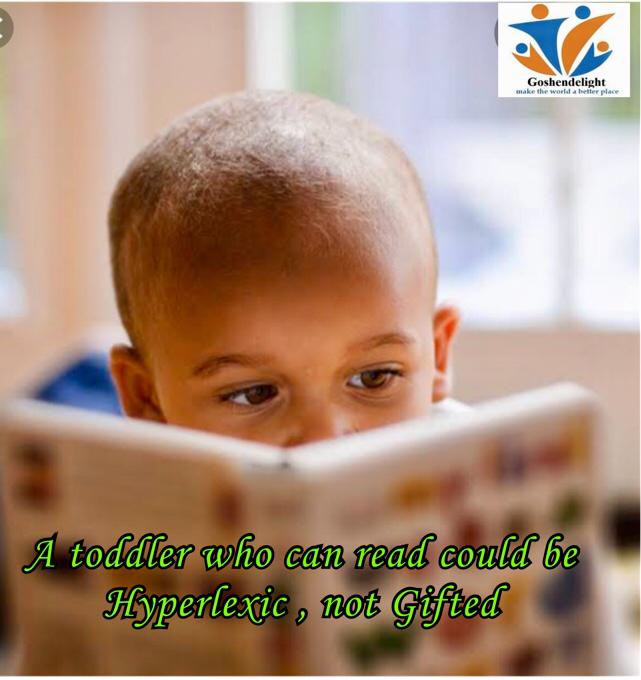A toddler who can read could be hyperlexic,not gifted
*A Toddler Who Can ‘Read’ Could Be Hyperlexic, Not Gifted*
Rory was a 2-year-old boy whom his teachers at toddler class described as “obsessed with letters.” He would only play with the plastic alphabet set, spending his time examining and arranging the pieces. When his teachers would try to offer him another toy, he would throw a fit. Rory would not respond to his name, but he would get upset when music was played and did not show any interest in playing with other children. His parents did not worry because he could quickly identify all the letters in the alphabet and name numbers up to 20.
“When a young child starts reading, parents feel that this is the best indicator that the child is learning. However, reading or the act of decoding is just the tip of the iceberg!” says Yvette Dinglasan-Crisostomo, the co-founder and a director of Spark Discovery Center who doesn’t believe academics should be the sole indicator of child development.
Three-year-old Patrick was reading way before he entered his nursery classroom. He would pick out a book from a shelf and start reading from cover to cover. But his teachers were worried because he didn’t seem to understand what he was reading. Whenever they asked him a question about the story, he would repeat the text word for word.
In reading, comprehension is integral
“A child may be able to read a text but not be able to make any sense of it because of lack of real-life experience to help him comprehend what he read,” explains Dinglasan-Crisostomo. “When I was 5 years old, I remember being able to read the sign ‘Post No Bill.’ But I wondered what that meant and why that was written on the walls and fences!”
While Patrick’s decoding and memory skills were advanced, his language and social skills were way below his peers. Because he didn’t know how to communicate with his classmates, he became aggressive, pummeling into them at random moments. Just like Rory’s parents, Patrick’s mom and dad were also not concerned, insisting that he was getting bored in school that was why he was acting up.
And even if he would not engage in conversations, spoke only in scripted phrases (would repeat lines from his favorite TV show for example) and could not attend to group discussions, his parents wanted him placed in a more academically challenging program.
Then there was Sarah, who at a year and a half, learned how to read using an app. What worried her teachers, however, was that the tone of her voice sounded like a cartoon character, high pitched with odd intonations as if she were mimicking the voice on the app. Except she wasn’t playfully copying the voice — that was how she naturally spoke.
“It felt like we were talking to a robot,” the teacher shared. “But her parents didn’t seem to mind that her speech was strange. They just kept directing our attention to how advanced she was for her age.”
Dinglasan-Crisostomo points out, “When a parent tells me that their preschool child is advanced or gifted because of early identification of letters and numbers, I acknowledge the skills the child exhibits. However, I point out that in the early years we always look at the whole child and all areas of development.
“I may suggest that the child may have good visual memory, hence the ability to identify symbols that are shown to them easily. However, there are other cognitive skills and many types of memory that a child will develop and use to learn and understand his world.”
*Gifted or hyperlexic?*
While parents are celebrating their child’s early reading skills, some early childhood educators are expressing concern and wondering if these children are truly gifted or what we call hyperlexic.
*Hyperlexia* is a condition characterized by having the ability to read far beyond what is expected of their age, as well as having strong memory skills. However, most hyperlexic children are unable to comprehend the meaning of the text and have delayed speech and social skills. Many will show an obsession with letters and numbers.
In Dr. Darold A. Teffert’s article in the Wisconsin Medical Society entitled “Hyperlexia: Reading Precociousness or Savant Skill,” he identifies three types of hyperlexia.
*Hyperlexia Type I *are very bright, neurotypical children who merely read early. When assessed, they are not categorized as gifted. In their preschool years, they could be reading at Grade 1 or 2 levels. But usually, their classmates catch up with them as time passes.
*Hyperlexia Type II* have astonishing memory and reading skills but have the language, social and behavioral skills characteristic of children with autism. Therefore, their hyperlexia is seen as a “splinter skill” that is part of another diagnosis.
According to the Center for Speech and Language Disorders, hyperlexia may be related to learning development disorder. “Although hyperlexia may be the key symptom in describing the learning difference in a child, it is not a stand-alone diagnosis.”
“[Hyperlexia] exists on a continuum with other disorders, such as autism spectrum disorders, language disorders, and nonverbal learning disabilities. Children with hyperlexia may also exhibit other conditions, such as sensory integration dysfunction, attention-deficit/hyperactivity disorder, motor dyspraxia, obsessive-compulsive disorder, depression and/or seizure disorder.”
*Hyperlexia Type III* also read early and have remarkable memorization abilities, but sometimes have advanced abilities in other areas, too. While they may seem to have “autistic-like” behavior, they do not have autism and are very outgoing and affectionate with family members, but reserved and distant with peers. Over time, their “autistic-like” behavior fades, and these children are quite neurotypical for their age.
_So what should you do if you or your child’s teacher suspect hyperlexia? _
Step 1: Get an assessment from a speech and language pathologist.
Phyllis Kupperman, one of the leading experts on hyperlexia advises, “The more accurately we can define the nature of the disorder, the more accurately we can design effective teaching strategies.” There are many documented cases of effective therapies and strategies that have helped hyperlexic children.
Step 2: Get early intervention.
This can make a huge difference in your child’s life. Through speech and occupational therapy, your child can be helped to learn how to develop language and social skills, as well as get help with sensory processing skills.
Kupperman relates, “One of the most striking things we have noticed in our experience with these children is that when we first see them at the age of 2 or 21/2. They look bad. They are not able to understand language. They may use a few words, but often they are echolalic. Their behavior looks autistic.”
In her paper, Kupperman discloses, “However, we have found that these children emerge out of that autism although they may retain some aloofness or antisocial and oppositional behaviors. Their need to maintain their aloneness and their need to engage in self-stimulating behaviors decreases dramatically as their language comprehension and expressive language improve.”
Step 3: Find the right school.
In the same article, Kupperman outlines the school set ups that work best for children with hyperlexia, depending on the goals for the child and his or her skills.
“It is important they be taught appropriate social skills and grouping them with children who use appropriate skills is a critical part of the planning.”
She specified these criteria to look for in a classroom:
Small classes size
Curriculum should include language development that is both expressive and receptive, written and oral.
Class routine is structured but not rigid
A variety of behavioral interventions should be available (do not rely solely on behavioral rewards system)
Classroom should have many visual and manipulative aids
The program should be flexible so that they can also use reading and rote-learned skills
Program contains opportunities for social interaction with appropriate peer group
Supportive services and teacher aides are available
So while parents celebrate their child’s early interest in reading, it would be prudent to see how much of what they are reading they can understand. Also, keep an eye out for the child’s speech development, see if they are not just repeating words or phrases but using them in the right context and can engage in spontaneous verbal exchanges.
Social skills are sometimes overlooked for very young children, but parents should watch out for eye contact, the child responding when his name is called, making friendly overtures to peers and enjoying playtime with others.
Finally, pay attention to sensory issues, like when the child is overly sensitive to light, sound, food or touch, and is often squinting, covering his ears, running away, crying or throwing tantrums.
There’s no quick fix to it, but the efforts you put in are well worth it. In Kupperman’s hyperlexia article, she states, “Because the eventual success of these children depends on the development of their comprehension and use of language skills, intensive speech, and language therapy and special education teaching can help achieve these objectives.”
If parents and teachers work with therapists to support language development, sensory issues and social skills, they give the child a chance at a better outcome.
Source: https://www.smartparenting.com.ph/parenting/toddler/are-you-sure-your-toddler-is-gifted-read-early-a1669-20180602-lfrm?utm_source=Facebook-SP&utm_medium=Ownshare&utm_campaign=20220521-fbnp-parenting-are-you-sure-your-toddler-is-gifted-read-early-a1669-20180602-lfrm-fbold-fbcap


